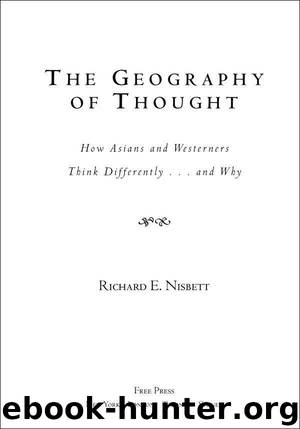The Geography of Thought: How Asians and Westerners Think Differently...and by Nisbett Richard

Author:Nisbett, Richard [Nisbett, Richard]
Language: eng
Format: mobi, azw3
Publisher: Free Press
Published: 2010-10-25T16:00:00+00:00
Easterners are almost surely closer to the truth than Westerners in their belief that the world is a highly complicated place and Westerners are undoubtedly often far too simple-minded in their explicit models of the world. Easterners’ failure to be surprised as often as they should may be a small price to pay for their greater attunement to a range of possible causal factors.
On the other hand, it seems fairly clear that simple models are the most useful ones—at least in science— because they’re easier to disprove and consequently to improve upon. Most of Aristotle’s physical propositions have turned out to be demonstrably false. But Aristotle had testable propositions about the world while the Chinese did not: It was Westerners who established what the correct physical principles are. The Chinese may have understood the principle of action at a distance, but they had no means of proving it. When it was proved true, it was by Western scientists who did not initially believe in it and who were actually trying to establish that all motion was of the billiard ball type, with objects moving only because they come into contact with some other object.
Westerners’ success in science and their tendency to make certain mistakes in causal analysis derive from the same source. Freedom to pursue individual goals prompts people to model the situation so as to achieve those goals, which in turn encourages modeling events by working backward from effects to possible causes. When there is systematic testing of the model, as in science, the model can be corrected. But Westerners’ models tend to be limited too sharply to the goal object and its properties, slighting the possible role of context. When it is everyday life—all too often a buzzing confusion—that is being modeled, recognition of error is more difficult. A mistaken model will be difficult to correct. So despite their history of scientific-mindedness, Westerners are particularly susceptible to the Fundamental Attribution Error and to overestimating the predictability of human behavior.
As we shall see next, Westerners’ preferred simplicity and Easterners’ assumed complexity encompass more than their approaches to causality. Their preferences extend to the ways that knowledge is organized more generally.
Download
The Geography of Thought: How Asians and Westerners Think Differently...and by Nisbett Richard.azw3
This site does not store any files on its server. We only index and link to content provided by other sites. Please contact the content providers to delete copyright contents if any and email us, we'll remove relevant links or contents immediately.
The Leavers by Lisa Ko(6513)
Born to Run: by Christopher McDougall(6312)
iGen by Jean M. Twenge(4724)
Sapiens by Yuval Noah Harari(4593)
The Kite Runner by Khaled Hosseini(4521)
Spare by Prince Harry The Duke of Sussex(4255)
Bullshit Jobs by David Graeber(3228)
Livewired by David Eagleman(3166)
Goodbye Paradise(3016)
Never by Ken Follett(2952)
A Dictionary of Sociology by Unknown(2534)
Harry Potter 4 - Harry Potter and The Goblet of Fire by J.K.Rowling(2443)
The Club by A.L. Brooks(2413)
People of the Earth: An Introduction to World Prehistory by Dr. Brian Fagan & Nadia Durrani(2366)
Machine Learning at Scale with H2O by Gregory Keys | David Whiting(2365)
The Social Psychology of Inequality by Unknown(2342)
Harry Potter and the Order of the Phoenix (5) by J.K. Rowling(2255)
Harry Potter and the Deathly Hallows (7) by J.K. Rowling(2252)
0041152001443424520 .pdf by Unknown(2247)
